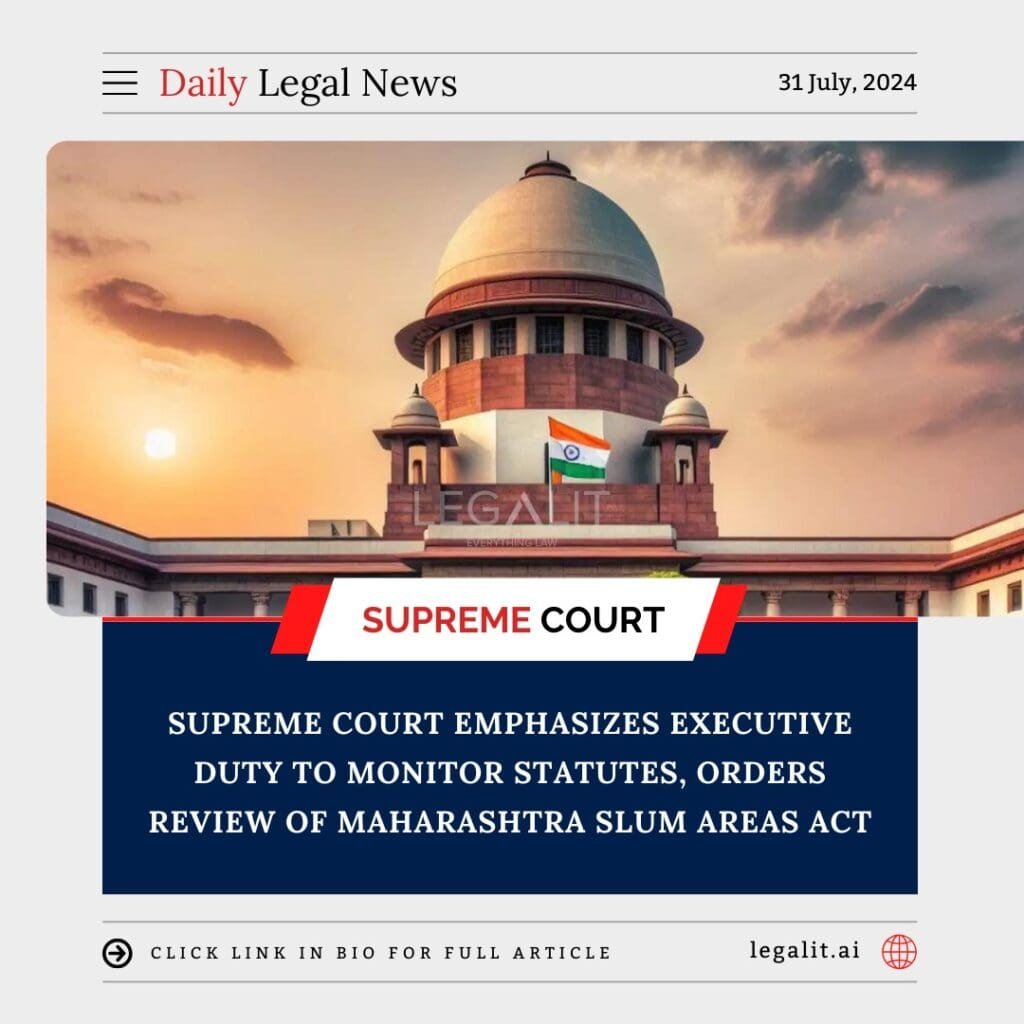
In a landmark judgment, the Supreme Court of India has reaffirmed the executive branch’s responsibility to monitor the implementation of statutes and has specifically ordered a review of the Maharashtra Slum Areas (Improvement, Clearance, and Redevelopment) Act, 1971. This directive aims to ensure that the law serves its intended purpose effectively and addresses the evolving needs of slum redevelopment and rehabilitation.
Background of the Case
The Maharashtra Slum Areas Act was enacted with the primary objective of improving living conditions in slum areas, clearing slums, and facilitating the redevelopment and rehabilitation of slum dwellers. Over the years, however, numerous issues have been raised regarding the Act’s implementation, including inefficiencies, corruption, and inadequate protection for the rights of slum residents.
Petitions brought before the Supreme Court highlighted the shortcomings in the execution of the Act and called for a thorough review to ensure it meets contemporary needs and effectively addresses the challenges of urban slum management.
Supreme Court’s Directive
- Executive Responsibility: The Court underscored the duty of the executive branch to continuously monitor and review the implementation of statutes. This includes assessing the effectiveness of laws and ensuring they are updated to reflect current realities and needs.
- Specific Review of the Maharashtra Slum Areas Act: The Court ordered the Maharashtra state government to conduct a comprehensive review of the Slum Areas Act. This review should focus on identifying gaps, inefficiencies, and areas that require reform to better serve the goals of slum improvement and redevelopment.
- Inclusive Process: The review process must be inclusive, involving various stakeholders such as slum dwellers, urban planners, social activists, and legal experts. This inclusive approach ensures that the perspectives and needs of those directly affected by the Act are considered.
- Report Submission: The Maharashtra government is required to submit a detailed report to the Supreme Court outlining the findings of the review and proposed amendments or measures to improve the Act’s implementation.
Implications of the Ruling
The Supreme Court’s directive has significant implications for governance and urban development:
- Enhanced Oversight: The ruling reinforces the importance of continuous oversight and evaluation of laws by the executive branch. This proactive approach ensures that statutes remain relevant and effective in addressing societal issues.
- Improved Slum Rehabilitation: A thorough review of the Maharashtra Slum Areas Act has the potential to address long-standing issues in slum rehabilitation and redevelopment, leading to better living conditions for millions of slum dwellers in Maharashtra.
- Precedent for Other States: The directive sets a precedent for other states to undertake similar reviews of their statutes related to urban development and slum management. This can lead to more effective and humane policies nationwide.
- Stakeholder Engagement: By mandating an inclusive review process, the Court emphasizes the importance of stakeholder engagement in policymaking. This can lead to more comprehensive and practical solutions that address the real needs of affected communities.
Moving Forward
To comply with the Supreme Court’s directive, the Maharashtra government should take several key steps:
- Establish a Review Committee: Form a committee comprising government officials, urban development experts, representatives of slum dwellers, and civil society members to oversee the review process.
- Conduct Public Consultations: Organize public consultations and forums to gather input from various stakeholders. This inclusive approach ensures that the review considers diverse perspectives and needs.
- Identify Key Issues: Focus on identifying critical issues such as land tenure security, adequacy of rehabilitation measures, transparency in the implementation process, and protection of slum dwellers’ rights.
- Draft Amendments: Based on the review findings, draft necessary amendments to the Maharashtra Slum Areas Act. These amendments should aim to enhance the effectiveness, transparency, and fairness of the Act’s implementation.
- Monitor Implementation: Establish mechanisms for regular monitoring and evaluation of the amended Act to ensure ongoing effectiveness and address any emerging challenges promptly.
Conclusion
The Supreme Court’s order for a review of the Maharashtra Slum Areas Act underscores the crucial role of the executive in monitoring and updating statutes to reflect contemporary needs and challenges. This directive not only aims to improve the living conditions of slum dwellers in Maharashtra but also sets a broader precedent for proactive governance and inclusive policymaking. As the Maharashtra government undertakes this review, it is an opportunity to create a more effective and humane framework for slum redevelopment and rehabilitation, ensuring a better quality of life for millions of urban poor.